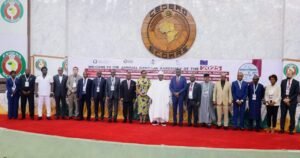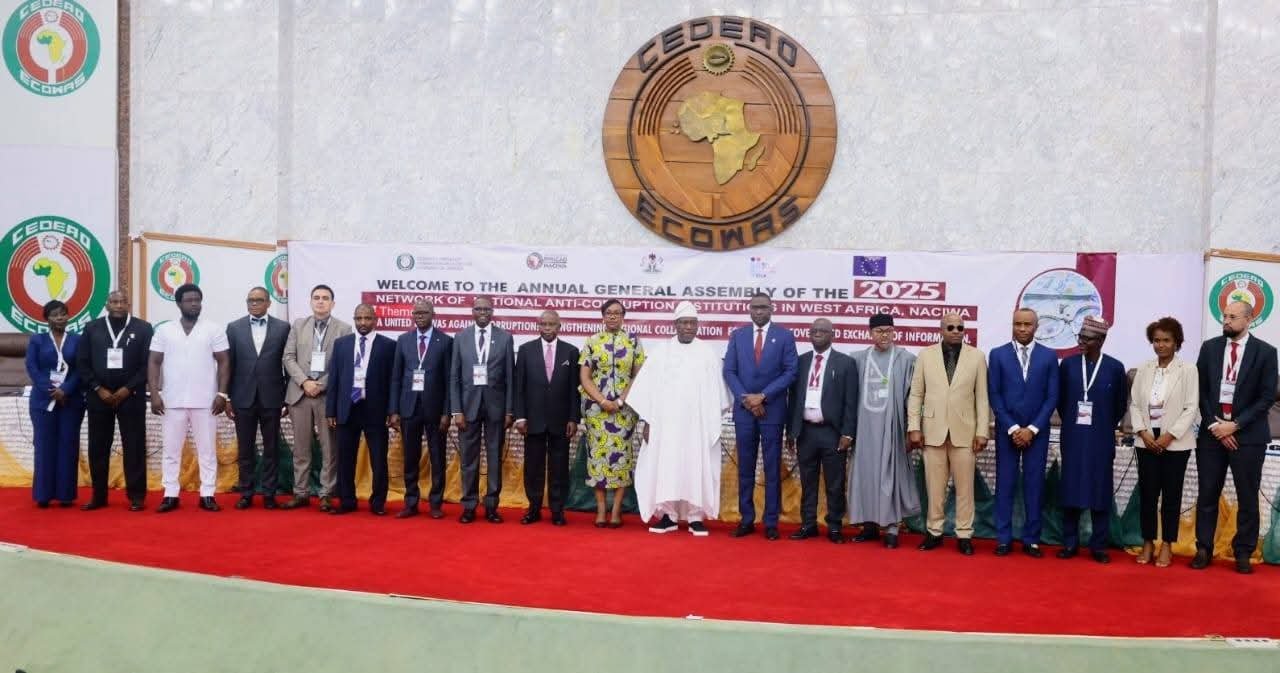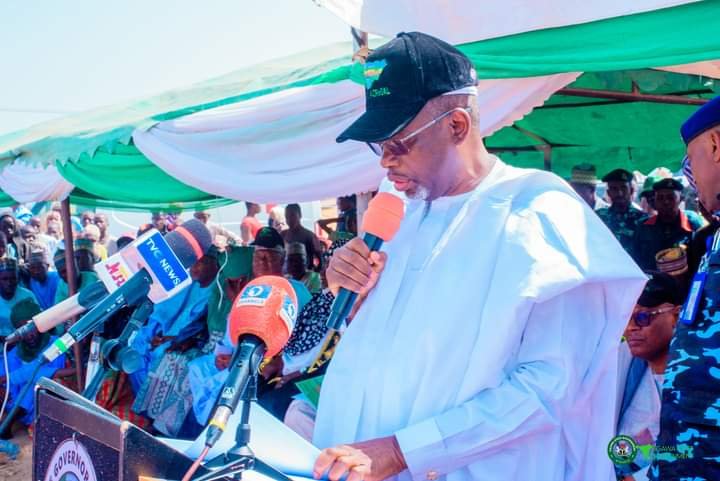Illegal Mining, Mineral Smuggling Threat To Peace, Stability in West Africa – Tinubu

President Bola Ahmed Tinubu says illegal mining and mineral smuggling are posing grave threat to the peace, stability, and economic prosperity in West Africa.
He said countries in the subregion must designate the theft of such resources as an international crime.
The President made the call on Tuesday in Abuja while declaring open the 7th Annual General Assembly of the Network of National Anti-Corruption Institutions in West Africa, NACIWA.
The event has the theme “A United ECOWAS Against Corruption: Strengthening Regional Collaboration for Asset Recovery and Exchange of Information”.
It brought together heads of anti-corruption agencies, ECOWAS officials, development partners, and civil society representatives.
Tinubu, who was represented by the Secretary to the Government of the Federation, George Akume, lamented that despite decades of reforms, illicit financial flows and resource theft continue to undermine regional development.
“Even now, illicit outflows remain an odious miasma. Stealing of mineral resources is on the rise in the region, fueling the proliferation of small arms and light weapons and other violent crimes such as kidnapping and banditry.
“These have exacerbated our security challenges and worsened the development outlook of the region,” he said.
He therefore called for urgent collective action, stressing that resource theft should be classified as an international crime.
“The time has come for ECOWAS to designate resource theft, illegal mining and stealing of minerals as an international crime that threatens the stability of the region, and galvanize the world against trade in stolen minerals from West Africa,” the president said.
He also underscored the importance of regional cooperation in tackling financial crimes and illicit flows.
“No country can single-handedly win the battle against illicit flows. It requires collaboration, and NACIWA offers ECOWAS a multi-state and multi-stakeholder platform to harness regional efforts against corruption and its manifestations,” he added.
The President highlighted Nigeria’s strides in anti-corruption, saying his administration has prioritized asset tracing and recovery, backed by a new legal framework for asset management.
“The vision has translated into the recovery of humongous sums by the anti-corruption agencies. One of the agencies, the Economic and Financial Crimes Commission, EFCC, under the leadership of Ola Olukoyede, who incidentally is the current President of NACIWA, has been prolific in recovering stolen assets,” he said.
According to him, the administration has ensured that recovered assets are channeled into productive use.
“Our commitment is to ensure that recovered stolen assets become enablers of growth and instruments for social inclusion.
“Two legacy programmes of my administration — the Students Loan Scheme and the Consumer Credit Scheme — commenced operation with the injection of N100 billion in recovered proceeds of crime by the EFCC,” he stated.
Earlier in his welcome address, Executive Chairman of the EFCC and President of NACIWA, Mr. Olukoyede, expressed gratitude to delegates and reaffirmed NACIWA’s role as a unifying platform for regional anti-corruption collaboration.
He said that despite challenges, the current executive committee has repositioned NACIWA into a “more dynamic and credible platform for regional collaboration.”
Among the key milestones he listed were enhanced regional visibility and formal recognition by ECOWAS, institutional strengthening through the establishment of a permanent secretariat in Nigeria, financial operability through standardized membership dues and control mechanisms, deepened partnerships with ECOWAS, UNODC, AU Anti-Corruption Board, and development partners, observer status at the GlobE Network, linking NACIWA to global anti-corruption bodies and the designation of the EFCC Academy as NACIWA’s Centre of Excellence for capacity development.
Olukoyede also stated that the network had proposed its formal recognition as a Technical Commission under ECOWAS Protocol Article 19, which would institutionalize coordination on investigations, asset recovery, and anti-corruption policies across the subregion.
“We must acknowledge the evolving landscape in which our institutions operate. Political transitions, security concerns, and governance challenges across member states underscore that our fight against corruption cannot be divorced from broader considerations of political stability and social justice,” he stated.
He urged members to use the Assembly as “a renewal of vision, leadership, and unwavering commitment to combating corruption, which remains a key obstacle to our region’s development and stability.”
In his special remarks, Attorney-General of the Federation and Minister of Justice, Lateef Fagbemi, SAN, lauded the EFCC Chairman’s leadership, describing it as “distinguished and exemplary.”
He said, “Let me commend the leadership of EFCC Chairman Ola Olukoyede, who, as NACIWA President, has strengthened the Network not only in integrity but also in transparency and accountability.”
Similarly, Senator Emmanuel Udende, Chairman, Senate Committee on Anti-Corruption and Financial Crimes, said the theme was timely, given corruption’s role in insecurity and poor governance.
“Its trans-border nature demands we go beyond national efforts to embrace strong regional cooperation, intelligence sharing, and joint asset recovery,” he said.
He pledged the support of the National Assembly in providing the necessary legal framework for international cooperation.
Hon. Ginger Onwusibe, Chairman, House Committee on Anti-Corruption and Financial Crimes, represented by Nnamdi Ezechukwu, said efforts to eradicate corruption must transcend borders.
“Corruption does not respect borders; it moves through our systems, our banks, our pockets, and our politics, that is why our efforts must also transcend borders,” Onwusibe said.
Also speaking, President of the ECOWAS Commission, Dr. Omar Alieu Touray, represented by Vice President Damtien L. Tchintchibidja, praised EFCC’s leadership in strengthening NACIWA’s role in building regional synergy, but said more needed to be done.
“NACIWA has made significant strides in promoting collaboration, though there is a need to further intensify cooperation,” he said.
The event was attended by the Chairman, Independent Corrupt Practices and Other Related Offences Commission, ICPC, Dr. Musa Adamu Aliyu SAN; Ambassador Gautier Mignot, Head of the EU Delegation to Nigeria and ECOWAS; representatives of UNODC, International IDEA, Code of Conduct Bureau, and civil society organizations.
It also featured a panel discussion moderated by Auwal Musa Rafsanjani of CISLAC, with panelists drawn from Liberia, Côte d’Ivoire, Sierra Leone, Guinea, and Nigeria, focusing on strategies for strengthening collaboration in asset recovery and information exchange.
The Assembly concluded with a renewed commitment by participants to deepen regional cooperation, harmonize legal frameworks, and advance collective action against corruption and financial crimes in West Africa.



